
Jan 22, 2017 | Non categorizzato
 Chiara Lubich visited Germany in 1998, from 1st November to 13 December, spending time at Aachen, Münster, Augsburg and then in Berlin at the invitation of the Evangelical Church community. In her address, part of which is published below. We present several excerpts from her speech given on November 19th at the the Berlin Memorial Church, in which she indicates the law of love as the royal road to Christian unity and dialogue with all believers. “The plain fact is that if we Christians now, at the dawn of the third millennium, take a good look back at our 2000 years of history and particularly at the last millennium, we cannot fail to be saddened by what we see: a painful succession of misunderstandings, arguments and conflicts. These have caused many rips and tears in the “seamless robe of Christ”, which is His Church. And whose fault is this? Without doubt, countless historical, cultural, geo-political, social factors have played their part …. But could it also be due to a weakening among Christians of their characteristic unifying bond of love? I think so. In fact, when we try to address the painful situation we find ourselves in, we must keep in mind the guiding principle of our common faith: God Love who calls us too to love. In these our times it is God Love who, in some way, must return once more to reveal Himself also to the Churches we are part of. It’s true that we can’t really know how to love others unless we have experienced being deeply loved ourselves, unless all Christians are convinced of how much God loves us. He loves us as individual Christians and also as Church. He loves the Church in so far as it has been faithful to God’s plan for it, but also – and herein lies the wonder of God’s mercy – He loves the Church even when it has not corresponded to that plan and has allowed divisions to occur, as long as now it is seeking for full communion with the other Churches. This is the consoling conviction that led John Paul II, trusting in the One who can draw good from what is bad, to reflect: “Could it not be that the divisions have also been a way which has led and is leading the Church to discover the many treasures contained in the Gospel of Christ and in the redemption he brought about? Perhaps such a wealth would not have come to light otherwise.” So, belief in God who is Love, also for the Church. But if God loves us, we cannot remain inert in the face of such divine benevolence. As true sons and daughters, we must respond to His love with love, individually and as Church. Perhaps we can say that the Churches over the centuries may have hardened somewhat within themselves against the relentless tide of indifference, of misunderstanding, if not of actual hatred between them. So now we need a supplement of love in each one; we would need, in fact, a whole tidal wave of love to invade all Christianity. Love towards the other Churches is what we’re talking about here, together with mutual love among the Churches: a love that enables each one to be a gift for the others, so that it is possible to hope in a Church of the future which is one, in which one alone is the truth, expressed in many ways, observed from different perspectives, made even more beautiful by the variety of interpretations. It’s not that any of the Churches would have to “die” (as some may think), rather each one will have to be “reborn” in unity. And to live in this Church of the future, in full communion, will be such a wonderful, miraculous reality, that it cannot fail to be noticed by the whole world.” More Chiara Lubic Center
Chiara Lubich visited Germany in 1998, from 1st November to 13 December, spending time at Aachen, Münster, Augsburg and then in Berlin at the invitation of the Evangelical Church community. In her address, part of which is published below. We present several excerpts from her speech given on November 19th at the the Berlin Memorial Church, in which she indicates the law of love as the royal road to Christian unity and dialogue with all believers. “The plain fact is that if we Christians now, at the dawn of the third millennium, take a good look back at our 2000 years of history and particularly at the last millennium, we cannot fail to be saddened by what we see: a painful succession of misunderstandings, arguments and conflicts. These have caused many rips and tears in the “seamless robe of Christ”, which is His Church. And whose fault is this? Without doubt, countless historical, cultural, geo-political, social factors have played their part …. But could it also be due to a weakening among Christians of their characteristic unifying bond of love? I think so. In fact, when we try to address the painful situation we find ourselves in, we must keep in mind the guiding principle of our common faith: God Love who calls us too to love. In these our times it is God Love who, in some way, must return once more to reveal Himself also to the Churches we are part of. It’s true that we can’t really know how to love others unless we have experienced being deeply loved ourselves, unless all Christians are convinced of how much God loves us. He loves us as individual Christians and also as Church. He loves the Church in so far as it has been faithful to God’s plan for it, but also – and herein lies the wonder of God’s mercy – He loves the Church even when it has not corresponded to that plan and has allowed divisions to occur, as long as now it is seeking for full communion with the other Churches. This is the consoling conviction that led John Paul II, trusting in the One who can draw good from what is bad, to reflect: “Could it not be that the divisions have also been a way which has led and is leading the Church to discover the many treasures contained in the Gospel of Christ and in the redemption he brought about? Perhaps such a wealth would not have come to light otherwise.” So, belief in God who is Love, also for the Church. But if God loves us, we cannot remain inert in the face of such divine benevolence. As true sons and daughters, we must respond to His love with love, individually and as Church. Perhaps we can say that the Churches over the centuries may have hardened somewhat within themselves against the relentless tide of indifference, of misunderstanding, if not of actual hatred between them. So now we need a supplement of love in each one; we would need, in fact, a whole tidal wave of love to invade all Christianity. Love towards the other Churches is what we’re talking about here, together with mutual love among the Churches: a love that enables each one to be a gift for the others, so that it is possible to hope in a Church of the future which is one, in which one alone is the truth, expressed in many ways, observed from different perspectives, made even more beautiful by the variety of interpretations. It’s not that any of the Churches would have to “die” (as some may think), rather each one will have to be “reborn” in unity. And to live in this Church of the future, in full communion, will be such a wonderful, miraculous reality, that it cannot fail to be noticed by the whole world.” More Chiara Lubic Center
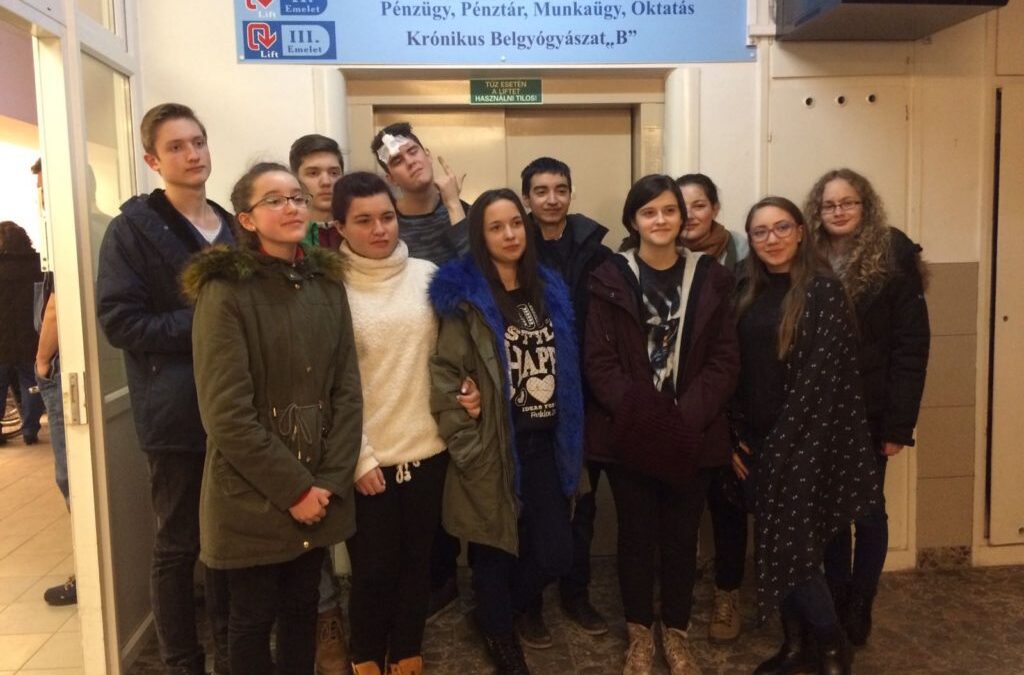
Jan 21, 2017 | Non categorizzato
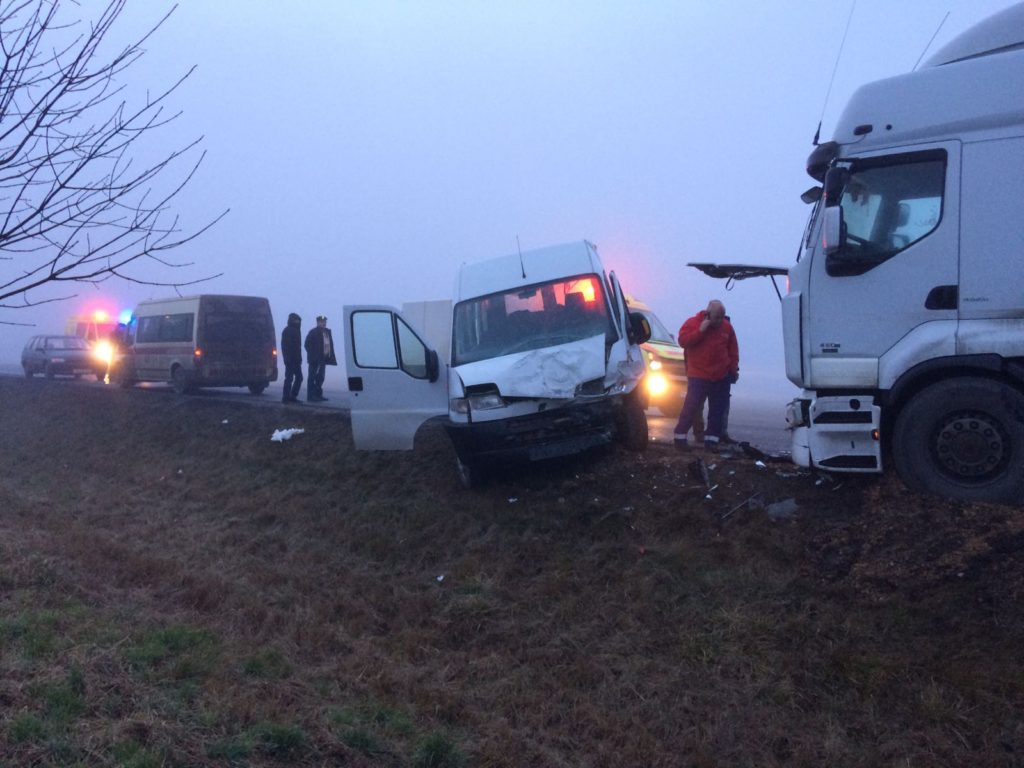 Accompanied by some of their assistants, thirteen Gen 3 were on their way to Focolare town in Krizevci, north Croatia. There was an atmosphere of serenity and great expectation during the trip. The theme of their congress would be challenging and demanding: Jesus Forsaken. The topic of suffering and pain is key to knowing how to live in a world of young people where so many seek well-being and false happiness. It was a long drive through Hungary. Towards evening some of the boys dozed off. Suddenly, the sound of horns and, in the midst of thick fog, a large truck just before the frightening crash. Teia, Adelin, Delia, Eve, Bea, Iulian and the other boys were still alive, but their shock was great. “The first car stopped just after the accident,” recounts one of the assistants. “It was an emergency vehicle. They had just finished their shift and were on their way back to the base. How could we not see God’s love in that? The police were excellent: they welcomed us in the largest room they had at police headquarters until another bus came to get us. They told us we were lucky to get out alive . . . then they brought us pizza and sweets.” Once we got to hospital, the boys were divided between wards. Bea: “At that moment we felt lost, we didn’t understand Hungarian, we were frightened and alone. We didn’t know what was happening and didn’t know how to answer the doctors’ questions. Some of us were comepletely isolated from the others, and alone like Jesus Forsaken. It was like meeting him and living him.” Eve: “Later on, people came and tranlsated for us. One focolarina from Romania was supposed to arrive in Hungary the previous day, but she had missed the bus. She was in a nearby city when she learned of the accident. The driver had proposed to the passengers not to make other stops and to take her directly to hospital to drop her off before helping us. She told us that understood why she had missed the bus the day before.”
Accompanied by some of their assistants, thirteen Gen 3 were on their way to Focolare town in Krizevci, north Croatia. There was an atmosphere of serenity and great expectation during the trip. The theme of their congress would be challenging and demanding: Jesus Forsaken. The topic of suffering and pain is key to knowing how to live in a world of young people where so many seek well-being and false happiness. It was a long drive through Hungary. Towards evening some of the boys dozed off. Suddenly, the sound of horns and, in the midst of thick fog, a large truck just before the frightening crash. Teia, Adelin, Delia, Eve, Bea, Iulian and the other boys were still alive, but their shock was great. “The first car stopped just after the accident,” recounts one of the assistants. “It was an emergency vehicle. They had just finished their shift and were on their way back to the base. How could we not see God’s love in that? The police were excellent: they welcomed us in the largest room they had at police headquarters until another bus came to get us. They told us we were lucky to get out alive . . . then they brought us pizza and sweets.” Once we got to hospital, the boys were divided between wards. Bea: “At that moment we felt lost, we didn’t understand Hungarian, we were frightened and alone. We didn’t know what was happening and didn’t know how to answer the doctors’ questions. Some of us were comepletely isolated from the others, and alone like Jesus Forsaken. It was like meeting him and living him.” Eve: “Later on, people came and tranlsated for us. One focolarina from Romania was supposed to arrive in Hungary the previous day, but she had missed the bus. She was in a nearby city when she learned of the accident. The driver had proposed to the passengers not to make other stops and to take her directly to hospital to drop her off before helping us. She told us that understood why she had missed the bus the day before.” 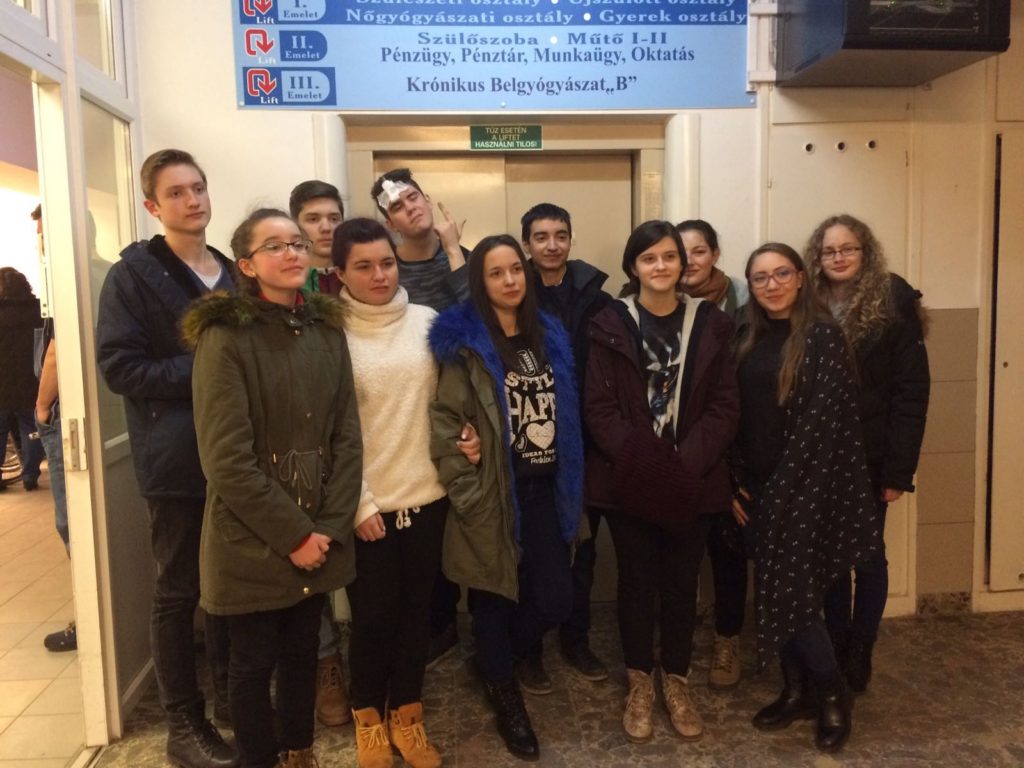 Rozi: “The doctors told us we had to stay in hospital for a few more examinations. I began to telelphone the boys’ parents. Many of them were 15 hours away from where we were. Moreover, the Gen3 were saying that they wanted to continue on to the congress. In the end we obtained permission to leave the hospital with the signature of their parents and without spending a cent.” Delia: “At that point we weren’t sure about continuing our journey, but we realized that such precious things always come with a cost.” Some days later seven boys arrived at Mariapolis Faro. The experience of fear and pain, but also of intense unity among them, showed that the theme of the congress had already become something real for them. Iulian recounts: “We all just knew that whatever happens to us in life, it’s worth it to abandon ourselves totallyto God. Jesus Forsaken unites us in an incredible way! We were allowed to live because God has a plan for us: a divine adventure awaits us.” Compiled by Chiara Favotti
Rozi: “The doctors told us we had to stay in hospital for a few more examinations. I began to telelphone the boys’ parents. Many of them were 15 hours away from where we were. Moreover, the Gen3 were saying that they wanted to continue on to the congress. In the end we obtained permission to leave the hospital with the signature of their parents and without spending a cent.” Delia: “At that point we weren’t sure about continuing our journey, but we realized that such precious things always come with a cost.” Some days later seven boys arrived at Mariapolis Faro. The experience of fear and pain, but also of intense unity among them, showed that the theme of the congress had already become something real for them. Iulian recounts: “We all just knew that whatever happens to us in life, it’s worth it to abandon ourselves totallyto God. Jesus Forsaken unites us in an incredible way! We were allowed to live because God has a plan for us: a divine adventure awaits us.” Compiled by Chiara Favotti
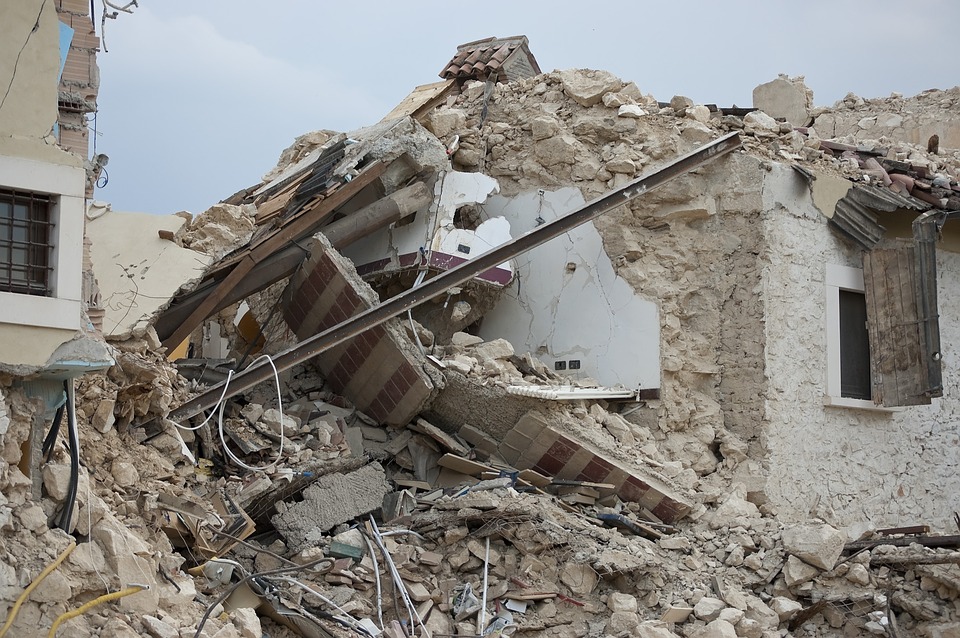
Jan 20, 2017 | Non categorizzato
 «In 142 seconds, the entire town of your childhood disappears. All that was built through the centuries is razed to the ground like a paper castle in 142 unending, damned seconds, and 299 lives are taken away from their loved ones. “Everything crumbles, and all is vanity of vanities,” is the phrase that echoes in my head while I write». This is how Lorenzo, 18, from the Marche Region started to recount his experience of remaining under the ruins of his house for some hours on 24 August. «It was 3.36 in the morning, they said, when a roar, a quake and an infernal phenomenon of dust and piles of rubble woke me up. Then came what some defined using the words of a poet, as the “quiet after the tempest.” All stood still in profound silence and it was pitch black. I was suddenly trapped in a space the size of my body. And with every small quake, a cloud of dust rose around me. My life was dangling on a string. Then at dawn, the village rescuers took me out of what I once called home and which is now just a pile of bricks starting again to call out to me. I want to share with you the joy of that moment, but words are not enough. Rescued after three hours in that inferno, there was destruction everywhere but in all this I could see only one thing: love. All went out to help the other, even placing their own lives in danger. Heedless of the hazards, they were really ready to give their lives. Sadly, or luckily, humanity gives the best of itself in suffering. Suffering is precisely the theme of my experience. I felt that despite all the people around my house, nobody could help or understand me. While praying I asked, “Why me?” and I thought: “My God, why have you abandoned me?” In reality he had not abandoned me, and when I came out I discovered why this experience has become a sort of lens through which I could see a different world, giving me the strength to live my life at best.». From the night of 24 August, and after the quakes of the succeeding months, there are still so many displaced victims of the Central Italy earthquake. These are people who had to leave their own homes, their properties and some even their own village. We really ask ourselves what they were able to bring with them after that tragic and eternal night, and what is giving them the strength to go ahead and start again. We chose Lorenzo’s story because it relays not only the fear lived that day, but also the discovery of something greater. Italy is strong, and is demonstrating great unity. There are many associations that are helping the earthquake victims, immediately involved through AMU, AFN and others to respond to the various needs. They tell us how they are working in the areas of Central Italy. «We are bringing animation activities ahead, and building a small meeting centre to allow the residents to keep up their community spirit. Then our efforts focused greatly on the support of the small agri-food enterprises of the territory, to allow them to continue operating in this emergency phase, and not to lose their jobs.» To support the small enterprises, they thought of creating a real project: «The progetto RimPRESA project. It consists of two lines: furnishing raw materials, machinery, and small infrastructure, and supporting the sales of products. Of course, at the base of all this, there must be human relationships with the people struck by the earthquake.» Source: Teens, work in progress 4 unity, New City editorial group, Rome 2016, n.6, pages 4-5 Info Progetto:www.focolaritalia.it rimpresa@focolare.org To collaborate:
«In 142 seconds, the entire town of your childhood disappears. All that was built through the centuries is razed to the ground like a paper castle in 142 unending, damned seconds, and 299 lives are taken away from their loved ones. “Everything crumbles, and all is vanity of vanities,” is the phrase that echoes in my head while I write». This is how Lorenzo, 18, from the Marche Region started to recount his experience of remaining under the ruins of his house for some hours on 24 August. «It was 3.36 in the morning, they said, when a roar, a quake and an infernal phenomenon of dust and piles of rubble woke me up. Then came what some defined using the words of a poet, as the “quiet after the tempest.” All stood still in profound silence and it was pitch black. I was suddenly trapped in a space the size of my body. And with every small quake, a cloud of dust rose around me. My life was dangling on a string. Then at dawn, the village rescuers took me out of what I once called home and which is now just a pile of bricks starting again to call out to me. I want to share with you the joy of that moment, but words are not enough. Rescued after three hours in that inferno, there was destruction everywhere but in all this I could see only one thing: love. All went out to help the other, even placing their own lives in danger. Heedless of the hazards, they were really ready to give their lives. Sadly, or luckily, humanity gives the best of itself in suffering. Suffering is precisely the theme of my experience. I felt that despite all the people around my house, nobody could help or understand me. While praying I asked, “Why me?” and I thought: “My God, why have you abandoned me?” In reality he had not abandoned me, and when I came out I discovered why this experience has become a sort of lens through which I could see a different world, giving me the strength to live my life at best.». From the night of 24 August, and after the quakes of the succeeding months, there are still so many displaced victims of the Central Italy earthquake. These are people who had to leave their own homes, their properties and some even their own village. We really ask ourselves what they were able to bring with them after that tragic and eternal night, and what is giving them the strength to go ahead and start again. We chose Lorenzo’s story because it relays not only the fear lived that day, but also the discovery of something greater. Italy is strong, and is demonstrating great unity. There are many associations that are helping the earthquake victims, immediately involved through AMU, AFN and others to respond to the various needs. They tell us how they are working in the areas of Central Italy. «We are bringing animation activities ahead, and building a small meeting centre to allow the residents to keep up their community spirit. Then our efforts focused greatly on the support of the small agri-food enterprises of the territory, to allow them to continue operating in this emergency phase, and not to lose their jobs.» To support the small enterprises, they thought of creating a real project: «The progetto RimPRESA project. It consists of two lines: furnishing raw materials, machinery, and small infrastructure, and supporting the sales of products. Of course, at the base of all this, there must be human relationships with the people struck by the earthquake.» Source: Teens, work in progress 4 unity, New City editorial group, Rome 2016, n.6, pages 4-5 Info Progetto:www.focolaritalia.it rimpresa@focolare.org To collaborate:
| Azione per un Mondo Unito ONLUS (AMU) |
Azione per Famiglie Nuove ONLUS (AFN) |
| IBAN: IT16 G050 1803 2000 0000 0120 434 at Banca Popolare Etica |
IBAN: IT55 K033 5901 6001 0000 0001 060 at Banca Prossima |
| Codice SWIFT/BIC: CCRTIT2184D |
Codice SWIFT/BIC: BCITITMX |
| CAUSE : Emergenza terremoto (Italia) |
| All contributions that are deposited in these two accounts for this cause will be jointly administered by AMU and AFN. Except for cash donations, Italian taxpayers can get deductions and allowances from income, in accordance with the regulations for non-profit organizations, to up to 10% of income and the € 70,000.00 annual limit. Tax benefits are provided in many European Union countries and other countries of the world in accordance with local regulations. |

Jan 19, 2017 | Non categorizzato
Download brochure with program Live streaming event 11 Mach 2017 16:00-18:30 (CET, UTC+1): http://live.focolare.org/FamilyHighlights/
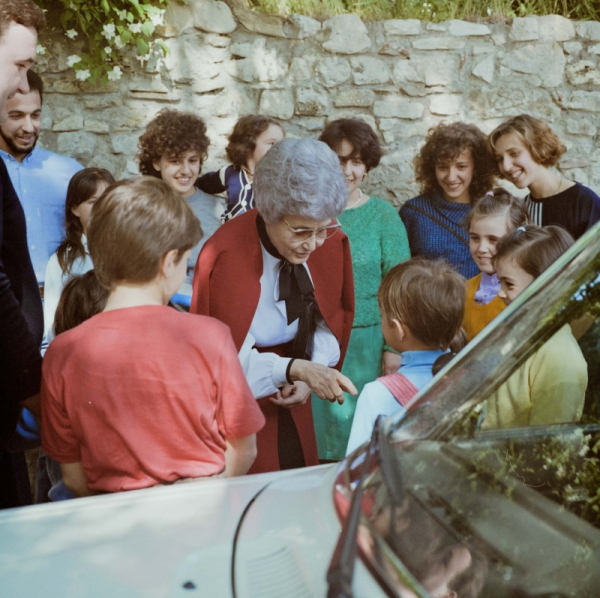 A series of events are to be held around the world in 2017 that will highlight the value of the family from the perspective of “universal brotherhood” and will bear witness to the richness of cultural diversity, through the ideal of unity incarnated in family life. The main event will be held in Loppiano from 10-12 March 2017, where about 800 participants from all over the world are expected. The families will be able to delve into the life of the international town of the Focolare and testify to the dream of Chiara Lubich which has reached all the continents. In the morning, there will be workshops for adults, young teenagers and children, in collaboration with the Parish Movement, the Gen3 and Gen4 centres, the New Families Association (AFNonlus) and the New Humanity Movement (AMU). In the afternoon there will be larger gatherings in the hall, with direct streaming. Presentations will be given by experts in family life, who are involved in the Cultural Seminar to be held at Sophia University Institute on March 10-11. The seminar will mark the opening of the Centre of Family Studies whose objective is to examine the contribution of the spirituality of unity to the family in today’s world. Three topics will be examined: Family, a story of relationships that evolve from ‘me’ to ‘us’ (relationships between the couple, with the children, among generations) Love as the appropriate measure for responding to critical problems in the family (wounds, challenges, sufferings: the reality of life and the sharing process). The family as a creative resource within the social fabric of any nation (life, family networks, solidarity and hospitality, social involvement and work)
A series of events are to be held around the world in 2017 that will highlight the value of the family from the perspective of “universal brotherhood” and will bear witness to the richness of cultural diversity, through the ideal of unity incarnated in family life. The main event will be held in Loppiano from 10-12 March 2017, where about 800 participants from all over the world are expected. The families will be able to delve into the life of the international town of the Focolare and testify to the dream of Chiara Lubich which has reached all the continents. In the morning, there will be workshops for adults, young teenagers and children, in collaboration with the Parish Movement, the Gen3 and Gen4 centres, the New Families Association (AFNonlus) and the New Humanity Movement (AMU). In the afternoon there will be larger gatherings in the hall, with direct streaming. Presentations will be given by experts in family life, who are involved in the Cultural Seminar to be held at Sophia University Institute on March 10-11. The seminar will mark the opening of the Centre of Family Studies whose objective is to examine the contribution of the spirituality of unity to the family in today’s world. Three topics will be examined: Family, a story of relationships that evolve from ‘me’ to ‘us’ (relationships between the couple, with the children, among generations) Love as the appropriate measure for responding to critical problems in the family (wounds, challenges, sufferings: the reality of life and the sharing process). The family as a creative resource within the social fabric of any nation (life, family networks, solidarity and hospitality, social involvement and work)  New logo. Fifty years after its founding, the New Families Movement changes its image with a new logo. It represents a tree, a sign of the growth of the tiny plant that over the years has produced many fruits of life that have been offered to families, to the Church and to the world. The plant is strong, which grew from the first seed that was welcomed by the good soil. Opening itself to others, the family has contributed to the birth and development of many seeds of brotherhood and peace that are sprouting a new society. Chiara Lubich (1920-2008) always paid particular attention to the family and, with the precious contribution of Igino Giordani, writer, Italian politician and first married focolarino, she lifted up his “bold, beautiful and demanding example” as a shining model for the construction of a peace in our world. In 1967 Chiara founded the New Families Movement that it might always keep love enkindled in the home, along with those family values that are so needed by today’s world. She saw the family has the best channel for reaching young people who will one day enter into married life; for broken families, widows and widowers, abandoned children – and every other form of marginalization. For more information: www.famiglienuove.org famiglienuove@focolare.org tel. 069411565
New logo. Fifty years after its founding, the New Families Movement changes its image with a new logo. It represents a tree, a sign of the growth of the tiny plant that over the years has produced many fruits of life that have been offered to families, to the Church and to the world. The plant is strong, which grew from the first seed that was welcomed by the good soil. Opening itself to others, the family has contributed to the birth and development of many seeds of brotherhood and peace that are sprouting a new society. Chiara Lubich (1920-2008) always paid particular attention to the family and, with the precious contribution of Igino Giordani, writer, Italian politician and first married focolarino, she lifted up his “bold, beautiful and demanding example” as a shining model for the construction of a peace in our world. In 1967 Chiara founded the New Families Movement that it might always keep love enkindled in the home, along with those family values that are so needed by today’s world. She saw the family has the best channel for reaching young people who will one day enter into married life; for broken families, widows and widowers, abandoned children – and every other form of marginalization. For more information: www.famiglienuove.org famiglienuove@focolare.org tel. 069411565
Jan 19, 2017 | Non categorizzato
https://vimeo.com/171535556 Copyright 2016 © CSC Audiovisivi – All rights reserved
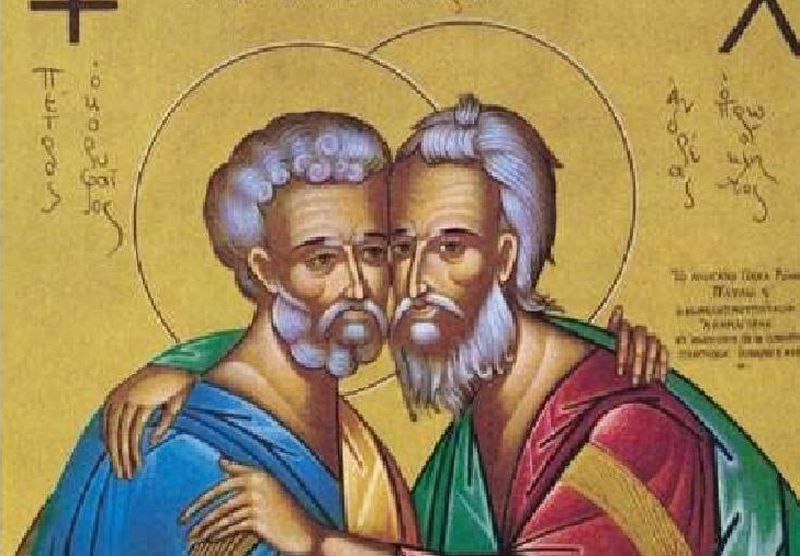
Jan 18, 2017 | Non categorizzato
 “The theme chosen for the 2017 Week of Prayer for Christian Unity is: “Reconciliation: The love of Christ compels us” (2 Cor 5:14). The Week was called for and organized by up to the most important organizations involved in ecumenism, including the Ecumenical Council of Churches and the Pontifical Council for the Promotion of Christian Unity: It was a propitious choice, especially after the celebration of the 500th anniversary of the Reform when many leading representatives of the Lutheran World Federation and Pope Francis gathered around the same altar in prayer at the Cathedral of Lund in Sweden. Alongside such highly significant ecumenical gestures another ecumenism has been spreading that could be called the ecumenism of the people. It is comprised of initiatives by the faithful of different confessions who want to recognize one another more and more as brothers and sisters. It is made up of small gestures that, thanks to the Holy Spirit, are already spreading in many places of the world. They show how far the irresistible journey of unity has come. We present a few examples from Latin America. “Many of us from the Focolare Movement in Peru had established friendships with the faithful of other Churches. Now, ever since an ecumenical group was begun in the Diocese of Arequipa, we have been collaborating with them in organizing the Week of Prayer. There will be daily events in several of the different Churches that visit the focolare regularly. Our centre was chosen for the final event of the Week of Prayer, which will include Catholic bishops, Lutheran pastors, Anglicans, Evangelicals and Pentecostals. Every month we attend an ecumenical breakfast at the YMCA, and a young Evangelical from a city in the north, with the permission of his Pastor, is attending a course of formation in the Focolare town of Loppiano, Italy.” The focolare community in Brazil reports: “We have relationships with Anglicans, Methodists, Presbyterians and Seventh Day Adventists that are truly significant. Sometimes we meet to dialogue about specific topics as we did at a conference held last August at Mariapolis Ginetta in san Paolo where we discussed the topic of peace.” “Because of our friendship with Methodists and Waldensians in Buenos Aires, Argentina, we set up on the square an ecumenical Nativity Scene that had been created by the children. It was visited by over a hundred and fifty people. It concluded with a moment of prayer with lit candles as a sign that each one of us can bring the light of Christmas into our own world.” From Venezuela: “Our sharing in the various celebrations of the Week of Prayer is an opportunity to deepen friendships that have existed for many years and to make new contacts. These friendships do not end when the celebration ends – on the contrary! The acquaintances most often lead to concrete assistance projects that we do together.” In conclusion, from Lima, Peru: “Following the ruinous floods on the outskirts, several young people from the Focolare and Methodist Church went to shovel away the mud that had covered the homes of so many humble folk. It was hard work, but we were all so happy to bring our love concretely to those families, to recognize that they are our brothers and sisters, and that we are also brothers and sisters.” Compiled by Anna Friso
“The theme chosen for the 2017 Week of Prayer for Christian Unity is: “Reconciliation: The love of Christ compels us” (2 Cor 5:14). The Week was called for and organized by up to the most important organizations involved in ecumenism, including the Ecumenical Council of Churches and the Pontifical Council for the Promotion of Christian Unity: It was a propitious choice, especially after the celebration of the 500th anniversary of the Reform when many leading representatives of the Lutheran World Federation and Pope Francis gathered around the same altar in prayer at the Cathedral of Lund in Sweden. Alongside such highly significant ecumenical gestures another ecumenism has been spreading that could be called the ecumenism of the people. It is comprised of initiatives by the faithful of different confessions who want to recognize one another more and more as brothers and sisters. It is made up of small gestures that, thanks to the Holy Spirit, are already spreading in many places of the world. They show how far the irresistible journey of unity has come. We present a few examples from Latin America. “Many of us from the Focolare Movement in Peru had established friendships with the faithful of other Churches. Now, ever since an ecumenical group was begun in the Diocese of Arequipa, we have been collaborating with them in organizing the Week of Prayer. There will be daily events in several of the different Churches that visit the focolare regularly. Our centre was chosen for the final event of the Week of Prayer, which will include Catholic bishops, Lutheran pastors, Anglicans, Evangelicals and Pentecostals. Every month we attend an ecumenical breakfast at the YMCA, and a young Evangelical from a city in the north, with the permission of his Pastor, is attending a course of formation in the Focolare town of Loppiano, Italy.” The focolare community in Brazil reports: “We have relationships with Anglicans, Methodists, Presbyterians and Seventh Day Adventists that are truly significant. Sometimes we meet to dialogue about specific topics as we did at a conference held last August at Mariapolis Ginetta in san Paolo where we discussed the topic of peace.” “Because of our friendship with Methodists and Waldensians in Buenos Aires, Argentina, we set up on the square an ecumenical Nativity Scene that had been created by the children. It was visited by over a hundred and fifty people. It concluded with a moment of prayer with lit candles as a sign that each one of us can bring the light of Christmas into our own world.” From Venezuela: “Our sharing in the various celebrations of the Week of Prayer is an opportunity to deepen friendships that have existed for many years and to make new contacts. These friendships do not end when the celebration ends – on the contrary! The acquaintances most often lead to concrete assistance projects that we do together.” In conclusion, from Lima, Peru: “Following the ruinous floods on the outskirts, several young people from the Focolare and Methodist Church went to shovel away the mud that had covered the homes of so many humble folk. It was hard work, but we were all so happy to bring our love concretely to those families, to recognize that they are our brothers and sisters, and that we are also brothers and sisters.” Compiled by Anna Friso

Jan 17, 2017 | Focolare Worldwide
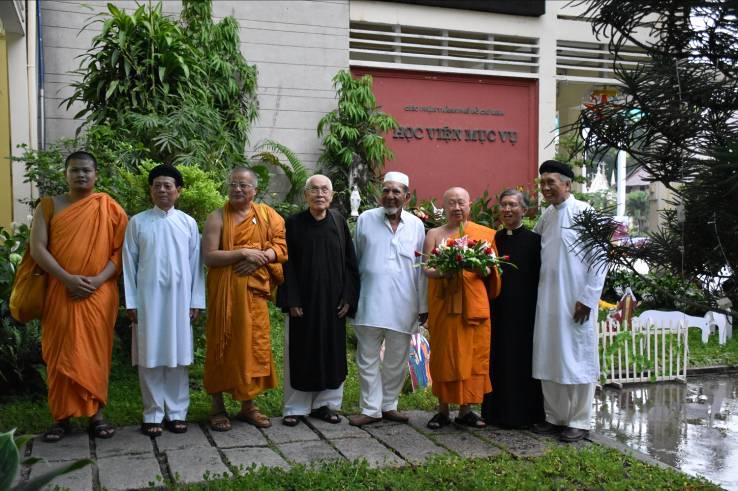 «These were days of ‘fire’, with the three monk-friends coming from Thailand: Phramaha Thongrattana Thavorn, Ajarn Suchart Vitipanyaporn, Bhikkhu Jayabhinunto and Mr. Khamphorn who accompanied them», Marcella and Luigi, Christian friends recounted, about the second week of December spent with the Buddhist monks in Ho Chi Minh City, Vietnam. Our friends stressed how «the atmosphere we breathed in these days was one of great openness and new horizons.» And continued by saying: «it was like living in a fable, so to say.» Some historical notes. The meeting of the monk, Phramaha Thongrattana Thavorn with the spirituality of unity goes back to 1995. He had come to Rome to accompany his disciple, Somjit, who was living for a short period in the community of monks before his marriage, as is the tradition of young Buddhists. Phramaha Thongrattana, which means ‘fine gold,’ and on that occasion had met Chiara Lubich and was strongly impressed. She too was impressed by him and on his request gave him a new name: Ardent Light. From then on this monk did his best to live and announce forcefully and with enthusiasm the ideal of universal brotherhood, the ideal of “mummy Chiara” (as he still calls her today). At the funeral of Chiara Lubich, in 2008, Ardent Light declared his wish to tell the Buddhists «how much good Chiara did to my life as a monk. I feel that she continues to give me an interior drive and the strength to bring the ideal of fraternity to all. She no longer belongs to you Christians, but now, she and her ideal are the legacy of the entire humanity.»
«These were days of ‘fire’, with the three monk-friends coming from Thailand: Phramaha Thongrattana Thavorn, Ajarn Suchart Vitipanyaporn, Bhikkhu Jayabhinunto and Mr. Khamphorn who accompanied them», Marcella and Luigi, Christian friends recounted, about the second week of December spent with the Buddhist monks in Ho Chi Minh City, Vietnam. Our friends stressed how «the atmosphere we breathed in these days was one of great openness and new horizons.» And continued by saying: «it was like living in a fable, so to say.» Some historical notes. The meeting of the monk, Phramaha Thongrattana Thavorn with the spirituality of unity goes back to 1995. He had come to Rome to accompany his disciple, Somjit, who was living for a short period in the community of monks before his marriage, as is the tradition of young Buddhists. Phramaha Thongrattana, which means ‘fine gold,’ and on that occasion had met Chiara Lubich and was strongly impressed. She too was impressed by him and on his request gave him a new name: Ardent Light. From then on this monk did his best to live and announce forcefully and with enthusiasm the ideal of universal brotherhood, the ideal of “mummy Chiara” (as he still calls her today). At the funeral of Chiara Lubich, in 2008, Ardent Light declared his wish to tell the Buddhists «how much good Chiara did to my life as a monk. I feel that she continues to give me an interior drive and the strength to bring the ideal of fraternity to all. She no longer belongs to you Christians, but now, she and her ideal are the legacy of the entire humanity.»  To go back to December 2016 in Ho Chi Min: «The first surprising fact – they said – was the bond of friendship that came about between Ardent Light and the Most Rev. Thich Thien Tam, monk in charge of the Pho Minh Pagoda, representative of both Theravada Buddhismo and of Mahayana in Vietnam. The latter is a personage who represents all aspects of Buddhism in Vietnam at international level. As a consequence of the trust and friendship generated between them, Rev. Thich Thien Tam had asked the competent authorities permission for the three monks to stay in the temple instead of a hotel as according to protocol. ». Various interreligious (and not only) events were held, such as their visit to two Christian communities, including lunch. The monks also took part in the Christmas feast, usually held for the local Christians, but they were welcomed with great joy by everyone. Then followed the two visits to social projects brought ahead by Christians inspired by the spirituality of unity. And then, the interreligious meeting at the Diocesan Pastoral Centre of Ho Chi Minh City, attended by representatives of five religions. On that occasion, Ardent Light spoke of his friendship with the Pope at that time, John Paul II and with Chiara Lubich. He explained about what she used to call “the art of loving”: a love that addresses everyone, and one that takes the initiative, that is able to be the other’s “neighbor,” that even goes to the point of loving and praying for one’s enemies… Marcella and Luigi recounted that «The eyes of some of the leaders present filled with tears – and to tell the truth, also those of our community.» The two hours of true dialogue concluded with the visit to the Archbishop emeritus, Cardinal J. Baptiste Phan Minh Man, who had so strongly worked for the creation of the interreligious dialogue at the Diocesan Pastoral Centre. The last day was dedicated to the visit to some temples, and acting as guide was Fr. Bao Loc, priest in charge of interreligious dialogue for the Diocese of Ho Chi Minh City. «Now new, unexpected horizons have opened before us, It is now up to us to continue the experience we have lived these days. Chiara’s legacy, of being always a family, is a reality that touches the hearts of everyone, when it is really lived.» By Gustavo Clariá
To go back to December 2016 in Ho Chi Min: «The first surprising fact – they said – was the bond of friendship that came about between Ardent Light and the Most Rev. Thich Thien Tam, monk in charge of the Pho Minh Pagoda, representative of both Theravada Buddhismo and of Mahayana in Vietnam. The latter is a personage who represents all aspects of Buddhism in Vietnam at international level. As a consequence of the trust and friendship generated between them, Rev. Thich Thien Tam had asked the competent authorities permission for the three monks to stay in the temple instead of a hotel as according to protocol. ». Various interreligious (and not only) events were held, such as their visit to two Christian communities, including lunch. The monks also took part in the Christmas feast, usually held for the local Christians, but they were welcomed with great joy by everyone. Then followed the two visits to social projects brought ahead by Christians inspired by the spirituality of unity. And then, the interreligious meeting at the Diocesan Pastoral Centre of Ho Chi Minh City, attended by representatives of five religions. On that occasion, Ardent Light spoke of his friendship with the Pope at that time, John Paul II and with Chiara Lubich. He explained about what she used to call “the art of loving”: a love that addresses everyone, and one that takes the initiative, that is able to be the other’s “neighbor,” that even goes to the point of loving and praying for one’s enemies… Marcella and Luigi recounted that «The eyes of some of the leaders present filled with tears – and to tell the truth, also those of our community.» The two hours of true dialogue concluded with the visit to the Archbishop emeritus, Cardinal J. Baptiste Phan Minh Man, who had so strongly worked for the creation of the interreligious dialogue at the Diocesan Pastoral Centre. The last day was dedicated to the visit to some temples, and acting as guide was Fr. Bao Loc, priest in charge of interreligious dialogue for the Diocese of Ho Chi Minh City. «Now new, unexpected horizons have opened before us, It is now up to us to continue the experience we have lived these days. Chiara’s legacy, of being always a family, is a reality that touches the hearts of everyone, when it is really lived.» By Gustavo Clariá

Jan 16, 2017 | Non categorizzato
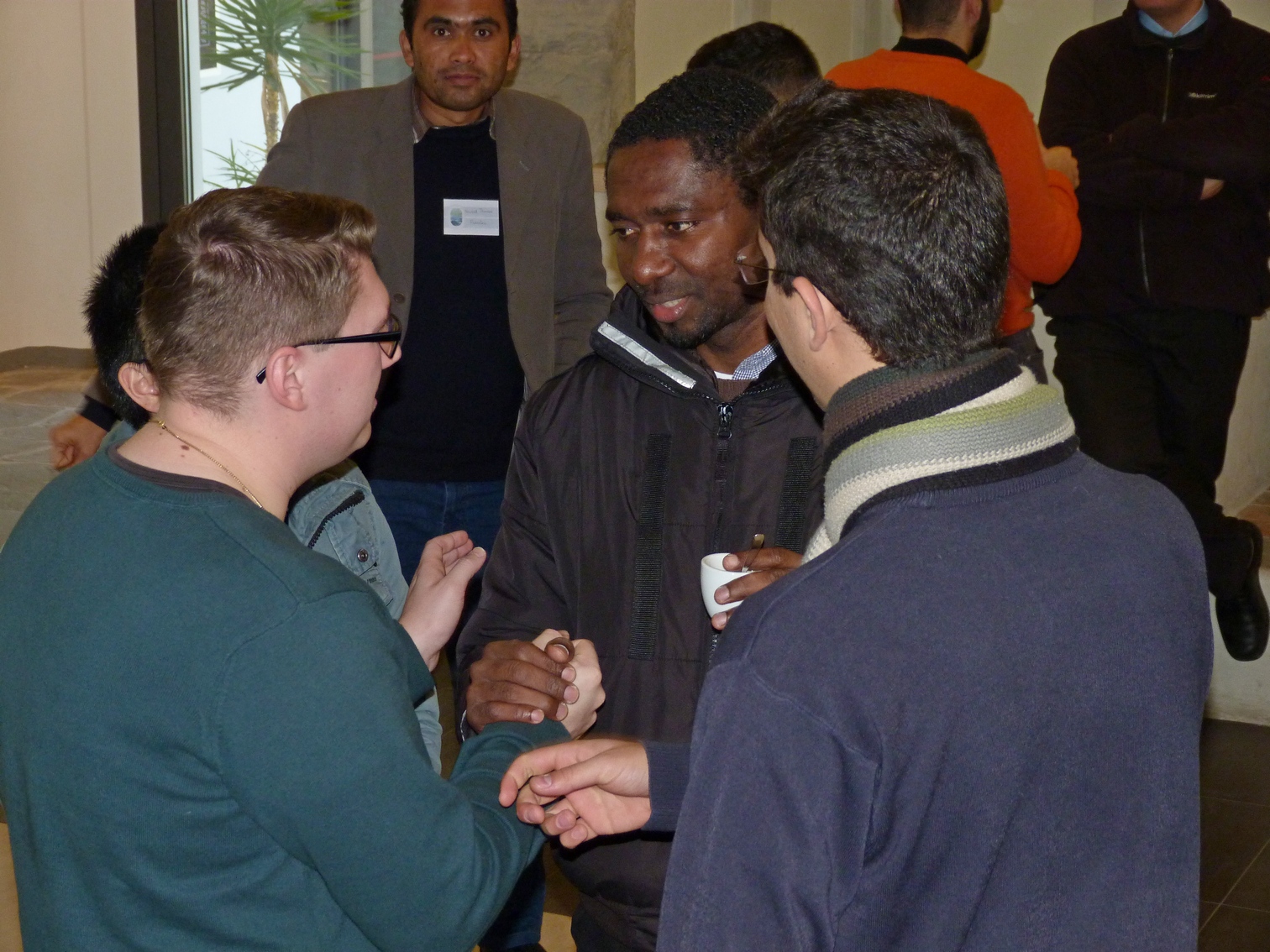 Over 40 seminarians and several priests from 17 countries on the 5 continents took an end-of-the-year holiday trip to Loppiano. “We chose the Focolare’s international town to have an experience of God in the communion among us,” they write, “and to go deeper into that radical choice of the Gospel that our heart burns for.” It was precisely the Gospel that they wanted to have as the basis of their stay in Loppiano, starting from the Golden Rule, that mandate which can also be found in the sacred writings of all the Great Religions: “So in everything, do to others as you would have them do to you” (Mt 7:12). The group stayed at Vinea Mea, the permanent residence of the School for Priests from different parts of the world who wish to be formed in the Focolare’s Spirituality of Unity and to experience a Church that St. John Paul II described as “Home and school of communion” (Novo Millennio Ineunte, 43). The seminarians were accompanied in their experience by the priests at Vinea Mea and by experts from Loppiano. The method used in presenting the topics – including some that were theologically quite dense – was dynamic and experiential and even included personal examples from their own lives, which helped the young men to come to terms with where they stood personally with Jesus’s message
Over 40 seminarians and several priests from 17 countries on the 5 continents took an end-of-the-year holiday trip to Loppiano. “We chose the Focolare’s international town to have an experience of God in the communion among us,” they write, “and to go deeper into that radical choice of the Gospel that our heart burns for.” It was precisely the Gospel that they wanted to have as the basis of their stay in Loppiano, starting from the Golden Rule, that mandate which can also be found in the sacred writings of all the Great Religions: “So in everything, do to others as you would have them do to you” (Mt 7:12). The group stayed at Vinea Mea, the permanent residence of the School for Priests from different parts of the world who wish to be formed in the Focolare’s Spirituality of Unity and to experience a Church that St. John Paul II described as “Home and school of communion” (Novo Millennio Ineunte, 43). The seminarians were accompanied in their experience by the priests at Vinea Mea and by experts from Loppiano. The method used in presenting the topics – including some that were theologically quite dense – was dynamic and experiential and even included personal examples from their own lives, which helped the young men to come to terms with where they stood personally with Jesus’s message 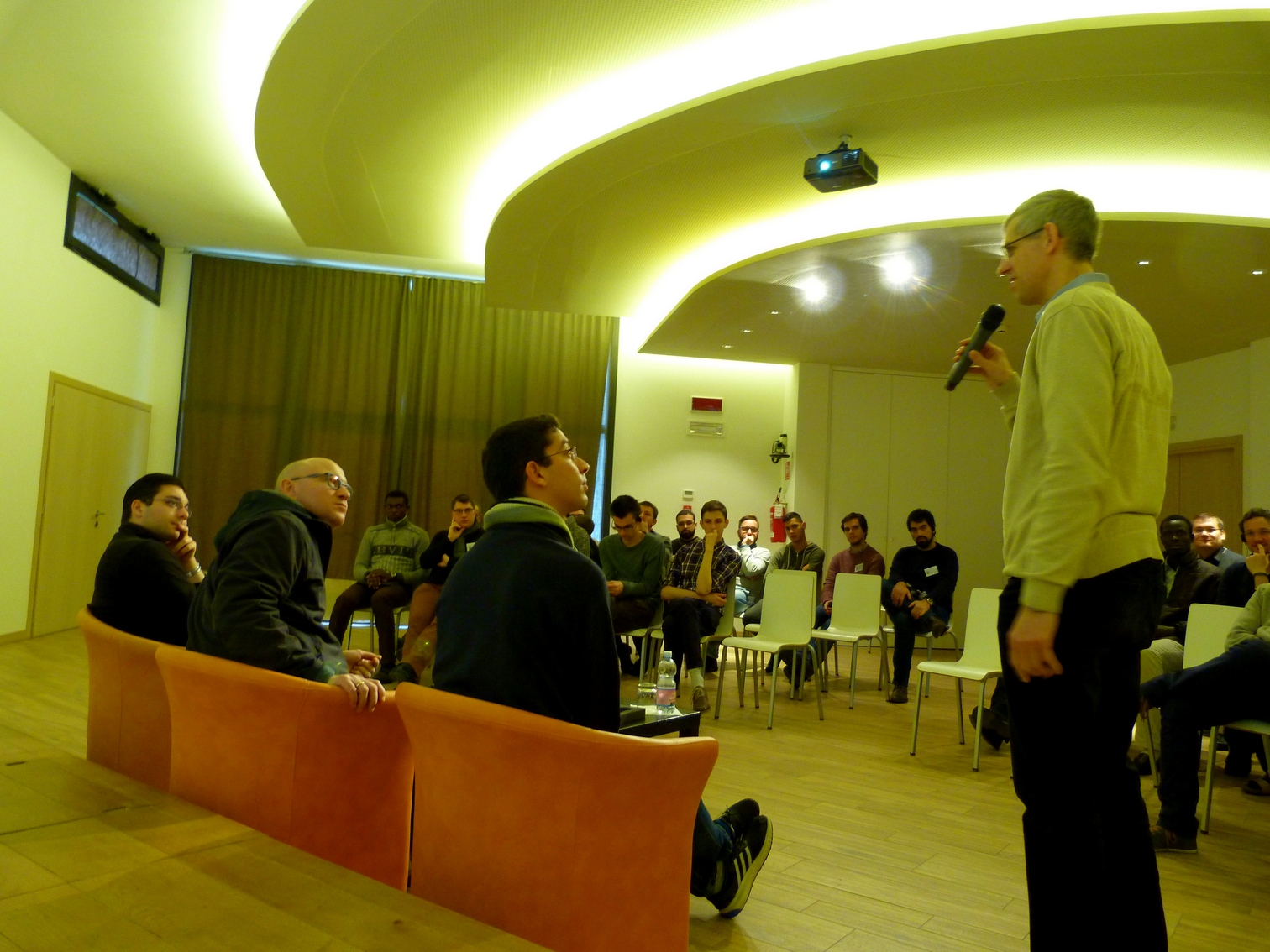 One of the seminarians writes: “I was very struck by one of the main points of the spirituality of Chiara Lubich, which was presented in the talk on ‘Jesus Forsaken, God’s window on the world and the world’s window on God’. I realized that his gaze of love opens the way for humankind toward God, but also opens God’s path toward humankind in a way that is ever new.” Another writes: “I understood that the Jesus who became a man out of love and expressed the culmination of that love in the abandonment on the cross, is not only a beautiful theological concept, but should become life in me, in love and service for whoever is near to me.” Their interaction with the citizens of Loppiano enhanced their understanding of how to build unity among themselves in spite of the many differences. Some impressions from at the concluding session: “In these days I discovered that even in our interpersonal relationships the key is being able to make myself nothing in front of the other person, as Jesus Forsaken did, burning the difficulties involved in the life of unity in Him.” “What struck me the most was the joy with which the inhabitants of the Mariapolis [Loppiano] face weariness and service, and transmit God to everyone else.” Compiled by the Gens Centre
One of the seminarians writes: “I was very struck by one of the main points of the spirituality of Chiara Lubich, which was presented in the talk on ‘Jesus Forsaken, God’s window on the world and the world’s window on God’. I realized that his gaze of love opens the way for humankind toward God, but also opens God’s path toward humankind in a way that is ever new.” Another writes: “I understood that the Jesus who became a man out of love and expressed the culmination of that love in the abandonment on the cross, is not only a beautiful theological concept, but should become life in me, in love and service for whoever is near to me.” Their interaction with the citizens of Loppiano enhanced their understanding of how to build unity among themselves in spite of the many differences. Some impressions from at the concluding session: “In these days I discovered that even in our interpersonal relationships the key is being able to make myself nothing in front of the other person, as Jesus Forsaken did, burning the difficulties involved in the life of unity in Him.” “What struck me the most was the joy with which the inhabitants of the Mariapolis [Loppiano] face weariness and service, and transmit God to everyone else.” Compiled by the Gens Centre
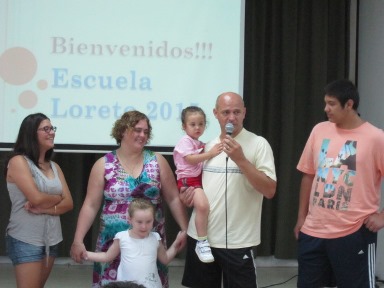
Jan 14, 2017 | Non categorizzato
 […] When God created humankind, he formed a family. When the Word of God came on earth, he chose to be born in a family. Jesus began his public life during the celebration of a new family. God had the family so much at heart; he considered it to be of such importance that he impressed on it his own image. In fact, the family reflects God’s very own life, the life of the Holy Trinity. […] So what was God’s plan for the family? God who is love, thought of the family as an intertwining of relationships of love: nuptial love between the couple, maternal and paternal love towards the children, filial love toward the parents, the love of grandparents for their grandchildren, of the grandchildren for their grandparents, for their uncles and aunts and vice versa. The family is therefore a treasure chest, a jewel, a mystery of love. This is how God thought of and created the family. Moreover, his Son, in redeeming the world, turned this natural love, which permeates the members of a family, into something sublime through the divine love he brought on earth, through the fire he wants to set alight everywhere. Through him, the family has become not only the primary cell of humanity created by God, but also the basic cell of the Church founded by his Son. Because of the supernatural love that the members of the family have for one another ‑ through baptism and the other sacraments, particularly the sacrament of matrimony ‑ they are called individually and collectively to the sublime heights of making the family a small church, an “ecclesiola”. […] Jesus wants the husband to see and love in his wife, not only the person with whom he shares his life, but to see and love Christ himself in her. In fact, Jesus considers done to him the way the husband treats his wife and vice versa. Furthermore, Jesus in the husband or wife must be loved in the measure that Jesus requires, as he expressed with the words, “Love one another as I have loved you” (John 13:34). They must love one another to the point of being ready to give their lives for one another. If parents keep this in mind throughout the day, whether they are praying, working or sharing a meal, whether they are resting or studying, laughing or playing with their children… every moment will be an opportunity for bearing witness to God. Morer: The Family and Prayer From Chiara Lubich’s talk to the international congress “Family and Society: The Family Centred on God is Open to all Humanity”, Castel Gandolfo, 8 April 1989.
[…] When God created humankind, he formed a family. When the Word of God came on earth, he chose to be born in a family. Jesus began his public life during the celebration of a new family. God had the family so much at heart; he considered it to be of such importance that he impressed on it his own image. In fact, the family reflects God’s very own life, the life of the Holy Trinity. […] So what was God’s plan for the family? God who is love, thought of the family as an intertwining of relationships of love: nuptial love between the couple, maternal and paternal love towards the children, filial love toward the parents, the love of grandparents for their grandchildren, of the grandchildren for their grandparents, for their uncles and aunts and vice versa. The family is therefore a treasure chest, a jewel, a mystery of love. This is how God thought of and created the family. Moreover, his Son, in redeeming the world, turned this natural love, which permeates the members of a family, into something sublime through the divine love he brought on earth, through the fire he wants to set alight everywhere. Through him, the family has become not only the primary cell of humanity created by God, but also the basic cell of the Church founded by his Son. Because of the supernatural love that the members of the family have for one another ‑ through baptism and the other sacraments, particularly the sacrament of matrimony ‑ they are called individually and collectively to the sublime heights of making the family a small church, an “ecclesiola”. […] Jesus wants the husband to see and love in his wife, not only the person with whom he shares his life, but to see and love Christ himself in her. In fact, Jesus considers done to him the way the husband treats his wife and vice versa. Furthermore, Jesus in the husband or wife must be loved in the measure that Jesus requires, as he expressed with the words, “Love one another as I have loved you” (John 13:34). They must love one another to the point of being ready to give their lives for one another. If parents keep this in mind throughout the day, whether they are praying, working or sharing a meal, whether they are resting or studying, laughing or playing with their children… every moment will be an opportunity for bearing witness to God. Morer: The Family and Prayer From Chiara Lubich’s talk to the international congress “Family and Society: The Family Centred on God is Open to all Humanity”, Castel Gandolfo, 8 April 1989.
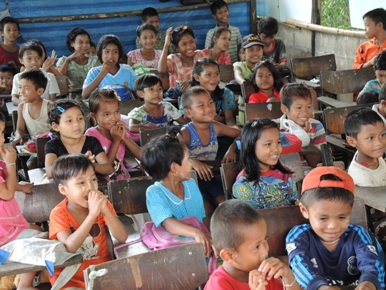
Jan 13, 2017 | Focolare Worldwide
 One of my acquaintances, years ago said: “wherever there are the poor, money also abounds.” I was young then and didn’t believe in those words: after 26 years in Asia, I realised to my dismay, that this is true also in Mae Sot. Notwithstanding any type of sustainable development or minimum respect for man and nature, paths are paved, and projects are springing up to bring the big industries, relocating them from where they find difficulty in being productive or are kicked out because it is illicit and dangerous for people’s health. All this is because there is a “work force” at low cost, very low, if not at zero cost; and on the other hand, there are the very wealthy people, ready to exploit the situation. The poor cross the border from Myanmar to Thailand, to escape from hunger and the discomforts of a country that is still struggling to reach social equality and protect the less fortunate classes or those of other religions. People are continuously expelled at the checkpoint and there are shooting incidents, with the children bearing the brunt of it all. There is a growing number of orphans, disabled and abandoned children, or those left alone at home while their parents are at work in the plantations. It is really sad to see children suffering! And Mae Sot is full of them. This is why we are trying to do something for them through our project. Every time we go to that area, we find our “special spots”: the orphanages, isolated homes in the countryside, and our little school Goccia dopo Goccia (Drop by Drop) with about 60 students: the places where you see so many of those kids with big black eyes that mark your soul indelibly. Our project is now in its 6th year (even if we have been helping the Karen people for decades) and reaches about 250 people in three countries (Thailand, Laos and Vietnam). All are direct and concrete micro projects for families often living below the minimum subsistence threshold. Their needs? Certainly food, clothes, but above all, love which means care, a smile, a bit of attention, in short: someone who says “how are you?” That means meeting people who know how to share the sufferings of a migrant population that is worth very little in the eyes of the rich, and is thus exploited. This is what we are trying to do: helping them, staying by their side, and giving relief, hope and warmth. Through our local contact person our aid reaches them monthly. Every three months we do the rounds of our projects, visiting them to make them feel that they have not been abandoned. They often say, “The fact that you travel so far to come and visit, gives us the strength and determination to go on living.” Those black eyes and unsmiling faces say more than a thousand words. They remind us of the works of Chiara Lubich who inspired our project: “Bring to me all the lonely people.” And we feel that these lonely people are all “ours” because they are images of the face of Jesus who continues to cry out on the Cross asking for all the love we can give. This is the sense of our project, but even more, it is our intimate joy. By: Luigi Butori For those who wish to join in the project: Banca Cantonale dei Grigioni, 7002 Coira IBAN-Nr: CH19 0077 4010 2957 6490 0 Goccia dopo Goccia Residenza Ragazzi 196a CH 7742 Poschiavo, Svizzera e mail: gica.ceccarelli@bluewin.ch oppure gocciadopogoccia.ms@gmail.com Association recognised by the tax administration of the Grigione district. Donations can be detracted from taxes..
One of my acquaintances, years ago said: “wherever there are the poor, money also abounds.” I was young then and didn’t believe in those words: after 26 years in Asia, I realised to my dismay, that this is true also in Mae Sot. Notwithstanding any type of sustainable development or minimum respect for man and nature, paths are paved, and projects are springing up to bring the big industries, relocating them from where they find difficulty in being productive or are kicked out because it is illicit and dangerous for people’s health. All this is because there is a “work force” at low cost, very low, if not at zero cost; and on the other hand, there are the very wealthy people, ready to exploit the situation. The poor cross the border from Myanmar to Thailand, to escape from hunger and the discomforts of a country that is still struggling to reach social equality and protect the less fortunate classes or those of other religions. People are continuously expelled at the checkpoint and there are shooting incidents, with the children bearing the brunt of it all. There is a growing number of orphans, disabled and abandoned children, or those left alone at home while their parents are at work in the plantations. It is really sad to see children suffering! And Mae Sot is full of them. This is why we are trying to do something for them through our project. Every time we go to that area, we find our “special spots”: the orphanages, isolated homes in the countryside, and our little school Goccia dopo Goccia (Drop by Drop) with about 60 students: the places where you see so many of those kids with big black eyes that mark your soul indelibly. Our project is now in its 6th year (even if we have been helping the Karen people for decades) and reaches about 250 people in three countries (Thailand, Laos and Vietnam). All are direct and concrete micro projects for families often living below the minimum subsistence threshold. Their needs? Certainly food, clothes, but above all, love which means care, a smile, a bit of attention, in short: someone who says “how are you?” That means meeting people who know how to share the sufferings of a migrant population that is worth very little in the eyes of the rich, and is thus exploited. This is what we are trying to do: helping them, staying by their side, and giving relief, hope and warmth. Through our local contact person our aid reaches them monthly. Every three months we do the rounds of our projects, visiting them to make them feel that they have not been abandoned. They often say, “The fact that you travel so far to come and visit, gives us the strength and determination to go on living.” Those black eyes and unsmiling faces say more than a thousand words. They remind us of the works of Chiara Lubich who inspired our project: “Bring to me all the lonely people.” And we feel that these lonely people are all “ours” because they are images of the face of Jesus who continues to cry out on the Cross asking for all the love we can give. This is the sense of our project, but even more, it is our intimate joy. By: Luigi Butori For those who wish to join in the project: Banca Cantonale dei Grigioni, 7002 Coira IBAN-Nr: CH19 0077 4010 2957 6490 0 Goccia dopo Goccia Residenza Ragazzi 196a CH 7742 Poschiavo, Svizzera e mail: gica.ceccarelli@bluewin.ch oppure gocciadopogoccia.ms@gmail.com Association recognised by the tax administration of the Grigione district. Donations can be detracted from taxes..

 Chiara Lubich visited Germany in 1998, from 1st November to 13 December, spending time at Aachen, Münster, Augsburg and then in Berlin at the invitation of the Evangelical Church community. In her address, part of which is published below. We present several excerpts from her speech given on November 19th at the the Berlin Memorial Church, in which she indicates the law of love as the royal road to Christian unity and dialogue with all believers. “The plain fact is that if we Christians now, at the dawn of the third millennium, take a good look back at our 2000 years of history and particularly at the last millennium, we cannot fail to be saddened by what we see: a painful succession of misunderstandings, arguments and conflicts. These have caused many rips and tears in the “seamless robe of Christ”, which is His Church. And whose fault is this? Without doubt, countless historical, cultural, geo-political, social factors have played their part …. But could it also be due to a weakening among Christians of their characteristic unifying bond of love? I think so. In fact, when we try to address the painful situation we find ourselves in, we must keep in mind the guiding principle of our common faith: God Love who calls us too to love. In these our times it is God Love who, in some way, must return once more to reveal Himself also to the Churches we are part of. It’s true that we can’t really know how to love others unless we have experienced being deeply loved ourselves, unless all Christians are convinced of how much God loves us. He loves us as individual Christians and also as Church. He loves the Church in so far as it has been faithful to God’s plan for it, but also – and herein lies the wonder of God’s mercy – He loves the Church even when it has not corresponded to that plan and has allowed divisions to occur, as long as now it is seeking for full communion with the other Churches. This is the consoling conviction that led John Paul II, trusting in the One who can draw good from what is bad, to reflect: “Could it not be that the divisions have also been a way which has led and is leading the Church to discover the many treasures contained in the Gospel of Christ and in the redemption he brought about? Perhaps such a wealth would not have come to light otherwise.” So, belief in God who is Love, also for the Church. But if God loves us, we cannot remain inert in the face of such divine benevolence. As true sons and daughters, we must respond to His love with love, individually and as Church. Perhaps we can say that the Churches over the centuries may have hardened somewhat within themselves against the relentless tide of indifference, of misunderstanding, if not of actual hatred between them. So now we need a supplement of love in each one; we would need, in fact, a whole tidal wave of love to invade all Christianity. Love towards the other Churches is what we’re talking about here, together with mutual love among the Churches: a love that enables each one to be a gift for the others, so that it is possible to hope in a Church of the future which is one, in which one alone is the truth, expressed in many ways, observed from different perspectives, made even more beautiful by the variety of interpretations. It’s not that any of the Churches would have to “die” (as some may think), rather each one will have to be “reborn” in unity. And to live in this Church of the future, in full communion, will be such a wonderful, miraculous reality, that it cannot fail to be noticed by the whole world.” More Chiara Lubic Center
Chiara Lubich visited Germany in 1998, from 1st November to 13 December, spending time at Aachen, Münster, Augsburg and then in Berlin at the invitation of the Evangelical Church community. In her address, part of which is published below. We present several excerpts from her speech given on November 19th at the the Berlin Memorial Church, in which she indicates the law of love as the royal road to Christian unity and dialogue with all believers. “The plain fact is that if we Christians now, at the dawn of the third millennium, take a good look back at our 2000 years of history and particularly at the last millennium, we cannot fail to be saddened by what we see: a painful succession of misunderstandings, arguments and conflicts. These have caused many rips and tears in the “seamless robe of Christ”, which is His Church. And whose fault is this? Without doubt, countless historical, cultural, geo-political, social factors have played their part …. But could it also be due to a weakening among Christians of their characteristic unifying bond of love? I think so. In fact, when we try to address the painful situation we find ourselves in, we must keep in mind the guiding principle of our common faith: God Love who calls us too to love. In these our times it is God Love who, in some way, must return once more to reveal Himself also to the Churches we are part of. It’s true that we can’t really know how to love others unless we have experienced being deeply loved ourselves, unless all Christians are convinced of how much God loves us. He loves us as individual Christians and also as Church. He loves the Church in so far as it has been faithful to God’s plan for it, but also – and herein lies the wonder of God’s mercy – He loves the Church even when it has not corresponded to that plan and has allowed divisions to occur, as long as now it is seeking for full communion with the other Churches. This is the consoling conviction that led John Paul II, trusting in the One who can draw good from what is bad, to reflect: “Could it not be that the divisions have also been a way which has led and is leading the Church to discover the many treasures contained in the Gospel of Christ and in the redemption he brought about? Perhaps such a wealth would not have come to light otherwise.” So, belief in God who is Love, also for the Church. But if God loves us, we cannot remain inert in the face of such divine benevolence. As true sons and daughters, we must respond to His love with love, individually and as Church. Perhaps we can say that the Churches over the centuries may have hardened somewhat within themselves against the relentless tide of indifference, of misunderstanding, if not of actual hatred between them. So now we need a supplement of love in each one; we would need, in fact, a whole tidal wave of love to invade all Christianity. Love towards the other Churches is what we’re talking about here, together with mutual love among the Churches: a love that enables each one to be a gift for the others, so that it is possible to hope in a Church of the future which is one, in which one alone is the truth, expressed in many ways, observed from different perspectives, made even more beautiful by the variety of interpretations. It’s not that any of the Churches would have to “die” (as some may think), rather each one will have to be “reborn” in unity. And to live in this Church of the future, in full communion, will be such a wonderful, miraculous reality, that it cannot fail to be noticed by the whole world.” More Chiara Lubic Center 





 A series of events are to be held around the world in 2017 that will highlight the value of the family from the perspective of “universal brotherhood” and will bear witness to the richness of cultural diversity, through the ideal of unity incarnated in family life. The main event will be held in
A series of events are to be held around the world in 2017 that will highlight the value of the family from the perspective of “universal brotherhood” and will bear witness to the richness of cultural diversity, through the ideal of unity incarnated in family life. The main event will be held in 




 One of the seminarians writes: “I was very struck by one of the main points of the spirituality of
One of the seminarians writes: “I was very struck by one of the main points of the spirituality of 
